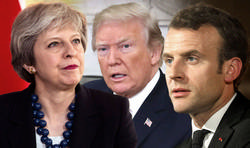Following the Syrian President Bashar al-Assad’s recent chemical attack on civilians last week in Douma, President Donald Trump, along with U.S. allies Britain and France, announced military action against Syria, sending missiles into chemical weapons facilities late in the evening on April 13.
General Joseph Dunford, Chairman of the Joint Chiefs of Staff, stated at the Pentagon the following day that three primary targets were hit: a scientific research center in Damascus, a chemical weapon development facility west of Homs, and a chemical equipment storage facility, which was also used as a command post. No civilian casualties have been reported at this time.
Following the strikes, Pentagon Spokeswoman Dana White, said that Trump declared, “[the] operations were very successful.”
“The combined American, British, and French response to these atrocities will integrate all instruments of our national power: military, economic and diplomatic,” said Trump.
Al-Assad has a long history of repeated use of chemical weapons and using them in attacks against his own people, causing large masses of civilian causalities and deaths from the chemical gas containing chlorine and another chemical agent called sarin.
The Syrian and Russian governments deny any involvement of chemicals and instead accuse rebel groups of fabricating the attack. Russian chemical weapons specialists and medical personnel claimed to have found no trace of chemical weapons.
However, about 500 patients seen at medical facilities were experiencing symptoms similar to those of having an exposure to toxic chemicals, following the April 7 attack.
Almost exactly one year ago, Trump announced missile strikes on Syria’s Shayrat air base in order to stop and prevent future chemical attacks, a decision made after al-Assad conducted a chemical attack resulting in more than 80 civilian deaths.
Trump explained his reasoning for the action, saying that “Years of previous attempts at changing Assad’s behavior have all failed, and failed very dramatically.”
“The USA never wins in its military interventions in the Middle East,” said Kenneth Mitchell, Ph.D., Chair of the Department of Political Science and Sociology, and an associate professor of political science. “This will be no different. Syria is a broken country, it just was made more so with this military action.”
Following the strikes, Russia called for an emergency meeting of the United Nations (UN) Security Council on Saturday, April 14.
Russian Ambassador to the UN, Vassily Nebenzia, quoted Russian President Vladimir Putin, saying that the U.S. and allies acted “without a mandate from the UN Security Council and in violation of the UN charter and the norms of international law.”
U.S. Ambassador to UN, Nikki Haley, responded to Putin’s comment, saying, “Russia was supposed to ensure that Assad did not use chemical weapons,” referring to Russia’s promise back in 2013 to eliminate Syria’s chemical weapons.
Bashar Jaafari, who currently represents Syria in the UN, stated that the military action was completed by “liars, spoilers, and hypocrites.”
The United States continues to warn al-Assad that further military action could be implemented if his chemical attacks continue. “The United States is locked and loaded if Syria uses gas again,” said Haley at the UN Conference last Saturday.
“We are prepared to sustain this response until the Syrian regime stops its use of prohibited chemical agents,” Trump added.
IMAGE TAKEN from express.co.uk




